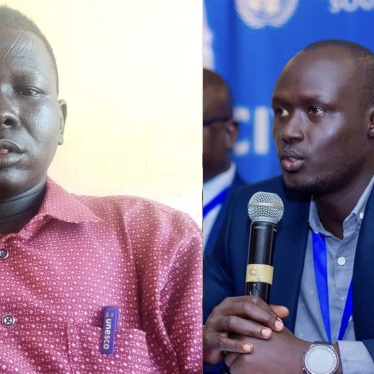Human Rights Watch welcomes the adoption of the outcome of the Universal Periodic Review (UPR) on Tanzania. While some important steps have been taken, much remains to be done.
Education
The government’s decision to remove school fees and contributions in lower secondary education as of January 2016 is an important step to meeting the right to education for all.
We therefore urge the Tanzanian government to end the use of corporal punishment in schools, including by revoking existing national regulations that approve and promote the use of corporal punishment by school officials.
Child Marriage
Since accepting all but one recommendations regarding the right to education, Tanzania has taken significant steps in recent years to combat its widespread problem of child marriage, including through a series of new legal measures that make it a criminal offense to marry school-going children under 18, as well as any person who impregnates a primary school or a secondary school girl. However, the law should be revised to remove provisions that criminalize consensual sex between young people.
The Tanzanian government took a major step backward by appealing a landmark high court ruling that found unconstitutional sections 13 and 17 of the Law of Marriage Act that allow girls to marry at age 15 with parental permission and at age 14 with the permission of a court.
The Tanzanian government should withdraw this appeal and revise the Marriage Act to include a uniform, internationally recognized minimum marriage age of 18 for both boys and girls. The government should also remove discriminatory policies that exclude from secondary school pregnant and married girls, and young mothers who have not completed basic education, and adopt special measures to ensure all children can go to secondary school.
Widow Inheritance
In April 2015, the CEDAW Committee found that Tanzania had denied “equality in respect of inheritance” for widows, and recommended that Tanzania provide reparations to the two widows in the case, and take other measures to eliminate discrimination with respect to inheritance and administration of property. More than a year later, the government of Tanzania has not adequately complied with the committee’s decision.
Key Populations
Tanzanians suffer serious abuse – being beaten by police and civilians, denied health care, and fired from their jobs – because of their sexual orientation or gender identity, or because of their sex worker status or drug use. Members of these key affected populations in the HIV epidemic are afraid to report crimes because they themselves are considered criminals. Violence and discrimination drive them away from essential health services. Governmental and non-governmental organizations increased HIV prevention outreach to key populations in recent years. That work is now at risk, after Tanzanian authorities arrested hundreds of sex workers, banned the distribution of lubricant, and raided an NGO that works with key populations. Human Rights Watch urges Tanzania to reconsider its rejection of recommendations to protect all people from discrimination, including “vulnerable and minority groups,” and, specifically, lesbian, gay, bisexual, transgender and intersex people.






